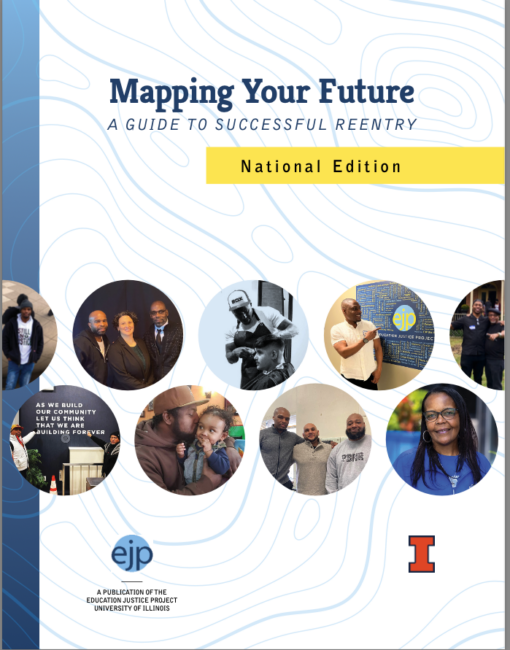
The Education Justice Project, part of the University of Ilinois Urbana-Champaign’s College of Education, provides courses and extracurricular programming at the Danville Correctional Center in Danville, Ill. It also publishes reentry guides, and has created a national edition of its previously Illinois-focused Mapping Your Future: A Guide to Successful Reentry.
This comprehensive guide includes nearly everything you need to know about reentry and then some. And it’s one of the best publications of its type that we’ve ever seen.
Mapping Your Future is divided into four main sections:
Before You Leave
This section of Mapping Your Future begins with an excellent set of questions and worksheets that can help you assess your skills, strengths, ability to deal with challenges and issues you may face in reentry. It has a list of ways to prepare yourself while still incarcerated by doing such things as getting your GED, taking college classes, meditate and attend anger management classes. It also has information on:
- Finding out how to get your documents – including social security card, birth certificate and ID – together, a process that could take as long as a year.
- Preparing for future employment by getting work experience within prison and writing a resume.
- Securing housing.
- Dealing with health issues by obtaining health records; getting a physical, dental and eye exam; finding potential health care providers; and possibly enrolling in Medicaid.
- Reestablishing relationships based on advice from those who’ve been incarcerated.
- Preparing for parole and dealing with its rules.
After You Get Out
Mapping Your Future’s second section covers a variety of issues and concerns, including how to:
- Get an ID.
- Register for Selective Service, if you’re between the ages of 18 and 25.
- Procure government benefits like SNAP (Supplemental Nutrition Assistance Program) which was formerly known as food stamps, Medicaid, Temporary Assistance to Needy Families (TANF), Social Security Retirement Benefits and Medicare.
- Access help with food, housing, health care and free- or low-cost mental health care.
- Secure housing, describing the types of housing available.
- Search for employment, with examples of jobs popular among individuals who were formerly incarcerated and how to find those jobs.
- Find and pay for educational programs and vocational training and learn about apprenticeships.
- Deal with health and health insurance and the type of routine exams you should consider getting.
- Recover from trauma.
- Handle substance abuse.
- Decide on a treatment program.
- Secure public transportation or buy a car.
- Use technology, including cell phones, internet, email, social media and video conferencing.
- Get legal help.
- Expunge your record.
- Deal with banks, debt, debit and credit cards, and taxes.
- Register to vote.
- Claim veterans’ benefits.
Healing and Moving Forward
The beginning of this section of Mapping Your Future highlights different types of wellness, from emotional and physical to social and spiritual. It describes the importance of:
- Building healthy relationships.
- Opening up and sharing with the people you love.
- Asking for help.
- Learning to be a better parent.
- Dealing with difficult emotions.
- Being able to manage your anger.
- Learning to practice mindfulness.
- Getting involved in your community.
A reentry directory
A comprehensive directory contains a wide variety of links to nationwide resources related to housing, food, health (both physical and mental), substance abuse, employment and training, legal assistance, family matters and veterans. It also includes resources specific to individual states.
Mapping Your Future: A Guide to Successful Reentry is provided for free to all individuals who are incarcerated or formerly incarcerated and request one. But it’s also available online. Organizations that can afford to pay for copies are asked to donate to the project.


